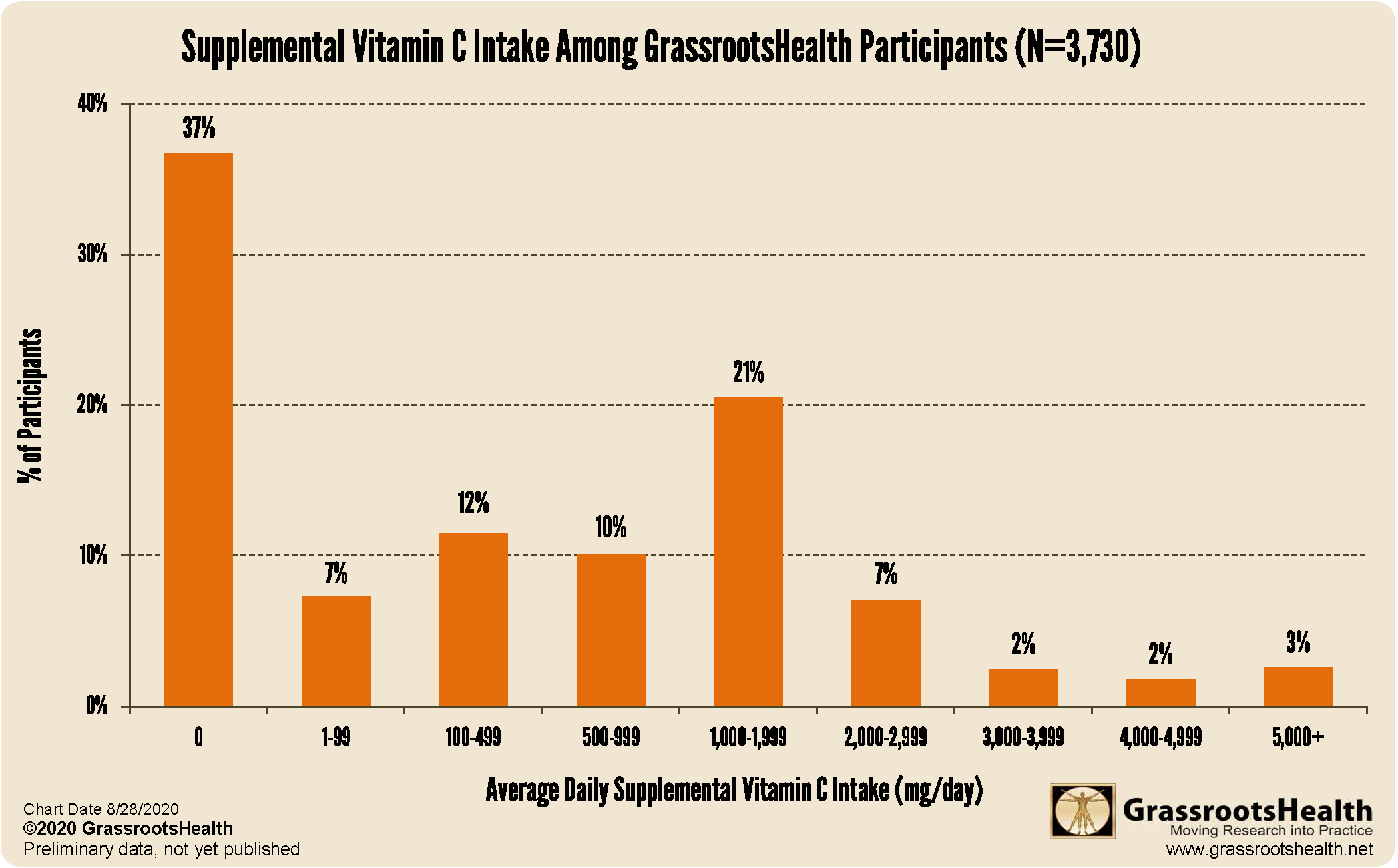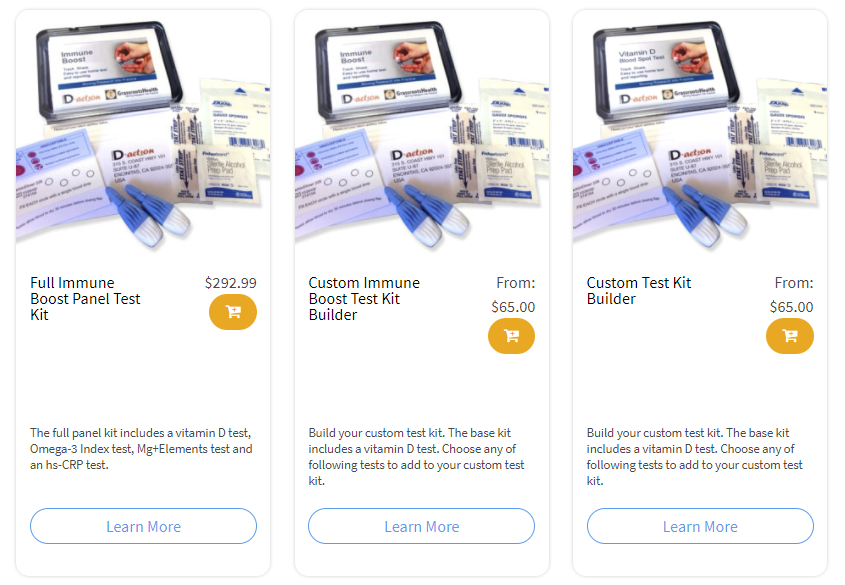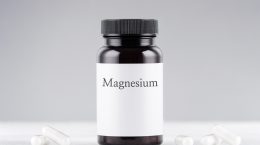Published on September 3, 2020
GrassrootsHealth collects information about supplemental intake amounts for a number of nutrients on its health and lifestyle questionnaire. In today’s post we will summarize reported intake amounts of supplemental vitamin C.
Vitamin C Intake Among GrassrootsHealth Participants
Among participants who reported a value for supplemental vitamin C, 63% reported taking some and 37% reported not taking any. The chart below shows the distribution of average daily supplemental vitamin C intake amounts for over 3,500 participants.
While the current RDA for vitamin C is 75 to 90 mg/day for most adults, about half of GrassrootsHealth participants (56%) take 100 mg or more and about one-third (34%) take 1,000 mg or more. During the COVID-19 pandemic, a number of nutrient organizations have recommended approximately 1,000 to 2,000 mg per day of vitamin C. Among participants who completed their questionnaire since March 2020, 21% reported taking at least 2,000 mg of vitamin C per day compared to 12% of those prior to March 2020.
Could taking vitamin C help improve vitamin D levels?
 A past analysis of the GrassrootsHealth data showed that on average, participants taking supplemental vitamin C in the amount of 1,000 mg/day or more had a higher vitamin D level for any given vitamin D intake amount than those taking less supplemental vitamin C. Specifically, 94% more supplemental vitamin D was needed for 50% of the population to achieve 40 ng/ml (100 nmol/L) for those not taking supplemental vitamin C compared to those who took 1,000 mg/day or more. The trend lines were similar for those taking no supplemental vitamin C and those taking 1-999 mg/day.
A past analysis of the GrassrootsHealth data showed that on average, participants taking supplemental vitamin C in the amount of 1,000 mg/day or more had a higher vitamin D level for any given vitamin D intake amount than those taking less supplemental vitamin C. Specifically, 94% more supplemental vitamin D was needed for 50% of the population to achieve 40 ng/ml (100 nmol/L) for those not taking supplemental vitamin C compared to those who took 1,000 mg/day or more. The trend lines were similar for those taking no supplemental vitamin C and those taking 1-999 mg/day.
Could a nutrient deficiency be affecting your immune response?
Learn more about how specific nutrients play direct roles in the various processes of the immune system response to infection and be sure to get enough of each. Do you know your nutrient levels? Do you know your levels of inflammation? Find out by testing your vitamin D, omega-3s, magnesium and other essential elements (including copper and zinc), as well as your inflammation levels, with the new Immune Boost home test kit offered by GrassrootsHealth. Measuring levels is the only way to know if you are supporting your immune system and whether additional changes should be made, with supplementation, dietary changes, or both.
Enroll now with the Full Immune Boost Panel (which includes tests for vitamin D, Omega-3 Index, magnesium, zinc, selenium, copper, and hsCRP), and get 10% off when you use coupon code BoostTen at checkout.
Are You Getting Enough Vitamin D to Help Yourself?
We’re in a time of great crisis that could be greatly affected by making sure you and everyone you know has a serum level of at least 40 ng/ml. Help us help you.
Do you know what your vitamin D level is? Be sure to test today to find out, and take steps to keep it within a target of 40-60 ng/ml or 100-150 nmol/L! Give your immune system the nutrients it needs to support a healthy you and protect yourself from unnecessary diseases, especially COVID-19.
GrassrootsHealth Nutrient Research Institute has launched the new Immune Boost project with the use of our myData-myAnswers nutrient health system that over 15,000 people are already using for their health. Specific markers that influence immune health are suggested for testing as part of this project including:
- Vitamin D
- Omega-3 Index
- Essential elements magnesium, selenium, and zinc
- hsCRP
We hope to demonstrate how one can use the Nutrient Research Model established by Dr. Robert Heaney to establish the effect of vitamin D serum levels of at least 40 ng/ml (100 nmol/L) on risk reduction with different ethnicities in the population. Status and intake of other nutrients will also be analyzed for any type of relationship to immune status and symptom severity. Please let us know if you’re interested in helping sponsor this project.
CLICK HERE for updates and new information about the project.
Through GrassrootsHealth Nutrient Research Institute, you can also test your essential elements magnesium, copper, zinc and selenium, toxins such as lead, mercury and cadmium, as well as your omega-3 levels, inflammation levels and thyroid stimulating hormone (TSH) level. Find out your levels today! Log on to the test selection page (click the link below) to get your tests and see for yourself if your levels can be improved.
Make sure you track your results before and after, about every 6 months!
Click Here to Access the Test Page
How can I track my nutrient intake and levels over time?
To help you track your supplement use and nutrient levels, GrassrootsHealth has created the Personal Health Nutrient Decision System called
For each specific supplement, you can track what days you take it, how much, and many other details. This will help you know your true supplemental intake and what patterns of use work for you to reach and maintain optimum nutrient levels. Check it out today!









